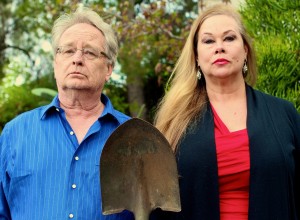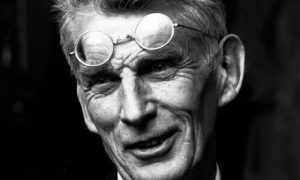‘Happy Days’: The ‘Bad Boys’ Are Up to Their Old Tricks
In Samuel Beckett’s Happy Days, the current entry from San Diego’s reborn cult-favorite Sledgehammer_, lead character Winnie is inextricably buried in sand to her chest, then her neck. She brays, coos and pines about her life “in the old style,” when great literature was her hot button amid what was once an apparently nondescript marriage. Now dependent on her doddering, bookish husband for companionship, she parses through her few belongings in a big black bag (notably, one of them’s a gun), obsesses about innocuous things like brushing her teeth and wakes to the sound of a deafening industrial alarm that signals the beginning to “another heavenly day.”
We’ve met Winnie before, at least in Aeschylus’ Prometheus Bound, wherein the gods chain the title character to a rock for introducing humans to fire. By comparison, Winnie’s gravest sin seems to be her incessant upbeatness. Like the gods who punished Prometheus, Beckett’s absurdist theater has always taken a pretty dour view of humanity. The difference is that his Winnie is downright funny and inviting and sympathetic, setting up the dramatic irony around which Sledgehammer_ built itself before its reincarnation.
This is a very good piece, featuring one of the few local actors who can pull Winnie off.

The shovel in the center, flanked by Francis Thumm and Dana Hooley, has its work cut out. Courtesy photo.
It’s the look – the leonine, jowly face; the thickened vocals, straight out of Bette Davis’ “Baby Jane” Hudson; the dangling, fatty biceps; the fishwife temperament; the bottomless bag with the gun she appears to kiss; the bug-eyes of a woman who hasn’t slept in this life; the fact that the mound of sand is as blubbery as she is – that defines Winnie in this show. Dana Hooley’s character looks, acts and feels as inextricable as Beckett seems to want her, and her foghorn of a voice is at once disarming and thoughtful all day.
“No better, no worse, no change – no pain,” she blathers amid the maddening routines that have sucked the life from her. “To have been what I always am – and so changed from what I was,” she pleads with the pathos of one who chooses life but prefers death.
She’s Beckett’s Everyman. To prove it, she’s got an emotionally bankrupt husband in tow. The rarely seen Willie (Francis Thumm, Hooley’s real-life husband) lives in a hole behind Winnie, constantly reading the newspaper and sporting a nasty and widening gash on the top of his head. Winnie is rapt as Willie blurts out a story about a dead priest, eventually insisting that she’d never say another word if Willie died or otherwise left. The irony is that, for all intents and purposes, he already has.
This jaded, faded couple, Beckett seems to say, has lived no better or worse than the rest of humanity – not because they themselves have taken a wrong turn but because life’s meaning is an illusion that man mistakenly interprets as reality. Winnie and Willie are and have always been frozen in time and space, and for better or worse, they and us are eternally interchangeable.
For director and Sledgehammer_ co-founder Scott Feldsher, Happy Days is Beckett’s lament at our ignorance. The Winnie both men give us is part clown and part Queen of Hearts, brimming with the lovable attributes of each, with Feldsher endorsing the bottomless pity Beckett must feel for her and her sad-sack Willie. Hooley and Thumm respond in kind – they’re playing not so much husband and wife as departed next-door neighbors, and the disconnection they portray is arguably palpable.

Samuel Beckett’s a great playwright, but he sure doesn’t seem to like us very much. Public domain photo.
Natalie Khuen’s set doesn’t quite take the play’s timelessness angle far enough amid the symmetry to the mounds of sand (especially in the second act, when Winnie’s home could morph into some kind of formlessness). Pea Hicks’ sound, Sarah Golden’s costumes and Lily Bartenstein’s lights cater nicely to the play’s abstractions.
This show plays at the Tenth Avenue Arts Theatre downtown – and the route I took to get there featured a couple strokes of irony. Not only did I pass by the (faceless) condos on the site of Sledge’s old Sixth Avenue digs; Sledge was the very first San Diego company I reviewed, on that very spot. That was in July of 2004, when the troupe’s [sic], by Melissa James Gibson, made me sit up and take their (and Gibson’s) notice.
Ten years and more than a thousand reviews later, I’m delighted to note the relentlessly experimentalist company’s return after five years (when earthquake zoning laws forced it from its old home), especially the little underscore at the end of the name. It represents a blank, signaling the troupe’s open-ended embrace of the art that awaits it.
The group that American Theatre magazine once called “the bad boys of San Diego theater” has returned. And that’s good.
This review is based on the performance of May 23. Happy Days runs through June 8 at the Tenth Avenue Arts Theatre, 930 Tenth Ave. downtown. $25, $30. 619-354-5888, sledgehammer.org.
